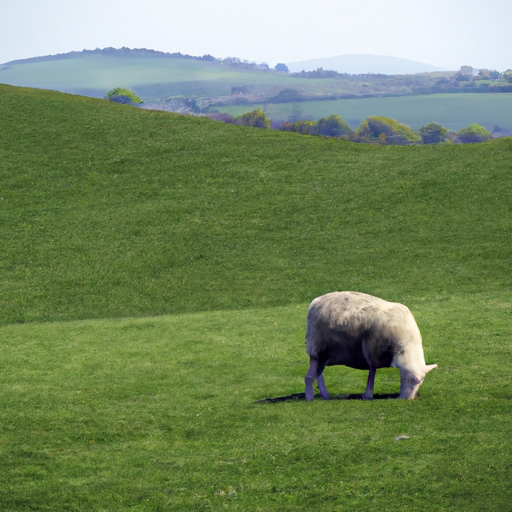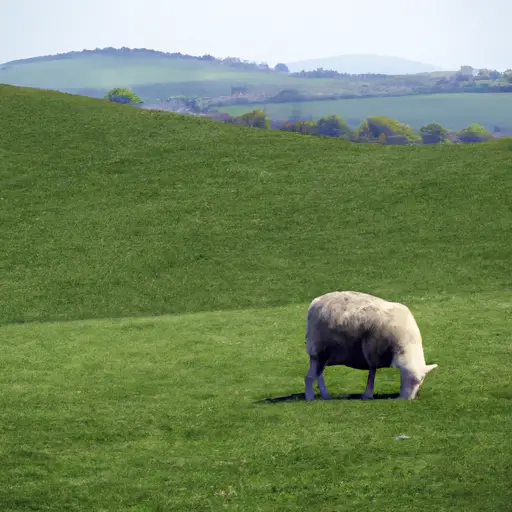So, you’re thinking about living off the grid and maybe even getting some sheep. That’s pretty cool! But before you dive headfirst into this new adventure, you might be wondering: how much space do sheep actually need? Well, my friend, I’ve got some answers for you.
When it comes to space requirements for sheep, it primarily depends on the number of sheep you plan to have. As a general rule of thumb, you’ll need at least two acres of land for every five sheep. Now, that might not sound like a lot, but keep in mind that these animals are social creatures and need room to roam and graze.
Of course, the more space you can provide, the happier your sheep will be. Sheep enjoy having enough room to roam freely and explore their surroundings. Plus, having ample space allows them to graze on fresh grass and keeps them physically active. Trust me, happy sheep make for a happier off-grid experience overall.
So, in conclusion, if you’re serious about living off the grid and raising sheep, you’ll want to ensure you have enough space to accommodate their needs. In this article (link to the article), we’ll dive deeper into the different factors to consider when it comes to providing the right amount of space for your flock. So stay tuned and get ready to learn more about creating the perfect off-grid home for your woolly friends!

Space Requirements for Sheep
Importance of Adequate Space for Sheep
When it comes to raising sheep, providing adequate space is crucial for their overall health and well-being. Sheep are naturally social animals and need sufficient space to roam, graze, and interact with their flock. Insufficient space can lead to various issues, including stress, disease, and behavioral problems. Therefore, understanding and fulfilling the space requirements of sheep is essential for their optimal growth and development.
Factors to Consider for Sheep Space Requirements
Several factors contribute to determining the space requirements for sheep. These factors include the breed, age, size, and number of sheep. Additionally, the purpose of raising sheep also plays a role in determining the necessary space. For example, if you are raising sheep for meat production, they may require more space compared to sheep raised for wool production. It is essential to consider these factors to provide the appropriate space needed for your specific flock.
Recommended Space per Sheep
The general rule of thumb for space requirements is to provide at least 20 square feet per sheep. This calculation takes into account the average size of a mature sheep and allows enough room for movement, grazing, and social interaction. Keep in mind that this minimum space requirement should be considered a starting point, as individual sheep may have different needs based on their behavior and size. Providing extra space is always beneficial, as it allows for a more comfortable environment and reduces the likelihood of disease transmission.
Type of Space Required for Sheep
The type of space required for sheep primarily depends on the environment and management system. Pasture-based systems are ideal for sheep as they mimic their natural habitat and provide ample space for grazing. A well-maintained pasture with dense, nutritious vegetation is essential for their diet and overall health. However, if the available land is limited, alternative systems such as dry lots can be utilized. Dry lots are small, enclosed areas where sheep are fed hay or other forages instead of grazing freely.
Fencing Requirements for Sheep Space
To ensure the safety of your sheep and prevent them from straying, proper fencing is necessary. The type of fencing will depend on various factors such as the terrain, predators, and the purpose of the sheep. Woven wire fences with smaller mesh size are commonly used to prevent sheep from escaping and to keep predators out. Electric fences can also be effective as a deterrent for predators, but extra caution should be taken to avoid accidental shocks to the sheep. Regular maintenance and inspection of the fencing is crucial to address any damages or weak spots promptly.
Shelter Considerations for Sheep Space
In addition to adequate grazing space, providing suitable shelter for sheep is essential, especially in regions with harsh climates. A well-designed shelter protects sheep from extreme weather conditions such as heat, cold, wind, and rain. The shelter should be well-ventilated, sturdy, and spacious enough to accommodate the entire flock comfortably. Bedding made from straw or wood shavings should be provided to ensure a dry and clean resting area for the sheep. Regular cleaning and disinfection of the shelter will prevent the buildup of harmful pathogens and promote good hygiene.
Access to Water in Sheep Space
Access to clean and fresh water is vital for the health and well-being of sheep. Sheep should have constant access to water throughout the day, especially during hot weather or when they are fed dry forages. Adequate water sources should be available within the grazing area to ensure easy accessibility for the sheep. Regular cleaning and monitoring of the water sources are necessary to prevent contamination and ensure a safe water supply for the flock.
Vegetation and Grazing Area for Sheep
Sheep are primarily grazing animals and require a significant amount of vegetation for their diet. A well-managed grazing area with a variety of nutritious plants will provide the necessary nutrients for their growth and development. The grazing area should be free from toxic plants and should be rotated periodically to allow for the regrowth of vegetation. Providing sufficient grazing space not only meets their nutritional needs but also encourages physical exercise and reduces stress among the flock.
Managing Space for Sheep Health and Well-being
In addition to providing adequate space, managing the sheep space effectively is crucial for their health and well-being. Regular monitoring of the flock’s behavior, body condition, and overall health is necessary to identify any signs of stress, disease, or nutritional deficiencies. It is important to observe their social interactions and ensure that all sheep have equal access to resources such as food, water, and shelter. Providing enrichment activities such as toys or structures for climbing can also promote mental stimulation and prevent boredom among the sheep.
Conclusion
In conclusion, providing sufficient space for sheep is vital for their overall health, well-being, and optimal growth. Understanding the factors that influence space requirements and fulfilling these requirements adequately will ensure a comfortable and safe environment for your flock. Regular monitoring, proper fencing, access to clean water, suitable shelter, and well-managed grazing areas are all essential components in satisfying the space requirements of sheep. By prioritizing their space needs, you can create a thriving environment for your sheep and promote their overall welfare.





